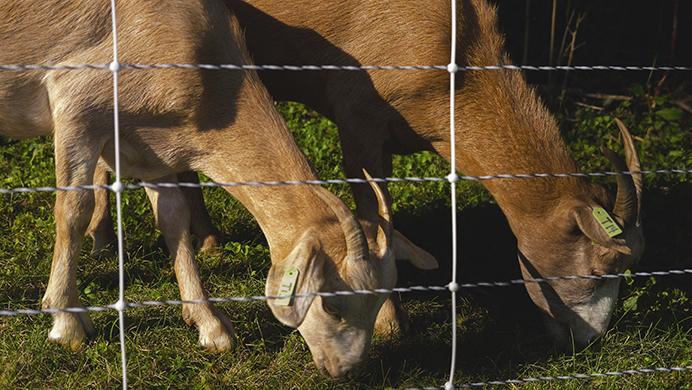Goats on the Go is an up-and-coming business hoping to take out vegetation in an ecologically sound — and uncommon — way.
By James Geerdes
Enclosed by temporary fencing, given almost an acre to graze on all of the greenery in the surrounding area, 35 goats are working away. Their job? To eat.
City High is home to the most recent Goats on the Go project. The company is a franchise providing vegetation control while growing individual herds of goats for farmers, said Aaron Steele, the founder of Goats on the Go. Individual farmers buy a franchise, which in return gives branding to the farmers.
Wild goats thrive in hilly, rocky spaces, and domesticated goats are no different. The animals provide an ecologically safe alternative to the pesticides and vegetation control most know, Steele said.
“Mainly, we wanted to meet a need, which was a need for an ecologically sound way to deal with a vegetation problem,” he said.
Steele said he is hoping to create a brand that will someday help smaller businesses all over the country. Currently, Steele has franchisees all over Iowa whose goats eat away at their local vegetation outbreaks.
“We aren’t out to compete against lawnmowers and other pesticides,” said Iowa City Goats on the Go franchise owner Aaron Swailes. “Areas that are rocky, sandy, and otherwise hard to mow — goats excel in these areas.”
Locally, Iowa City residents and businesses are growing more and more comfortable with the idea of goats in their backyards, Swailes said. Specifically, the School District has employed the animals on numerous occasions to help control brush buildups at local schools.
City High recently sought out the goats to fight back against an expansion of brush along its southeastern border near its tennis courts, City High Principal John Bacon said. He continued to say that he is happy to see the goats, both as vegetation control and as an attraction for locals.
RELATED: UI gets its goat
“Every time I’ve been at school, there’s been a crowd of people watching them at City,” he said. “It’s definitely a positive attraction for people.”
The expansion of Swailes’ herd has allowed him to be more efficient with his brush-control projects, he said. Customers generally call with inquiries regarding cost of the goats, types of vegetation that they eat, and other general questions about how the goats work, he said. Then Swailes will provide them with a cost estimate.
The prime season for goats to work is late April through August, and franchise owners can cover projects based on their number of goats, Swailes said. His individual herd has done around 15 projects since May, he said.
Goats on the Go has been well-received in the area, Bacon said, but a main concern is trespassers ignoring the “Do not enter” signs and trying to get closer to the animals.
“[Trespassers] have become more of an issue,” Swailes said. “It doesn’t seem to matter what kind of signage we post, but [we] haven’t had any major concerns.”
As the goat projects build up, Bacon said, he hopes the goats will make a return after finishing their current project.
“I think that if the goats keep eating and keep up the good job, they will have more opportunities here at City High,” he said.



